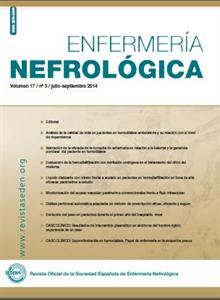Contenido del artículo principal
Resumen
Durante el primer año de trasplante renal es frecuente una ganancia de peso, debido, entre otros a la dieta, sedentarismo, e inmunosupresores, pudiendo aumentar los factores de riesgo del síndrome metabólico.
Objetivos. Conocer la evolución del peso de nuestros pacientes durante el primer año del trasplante, y analizar la influencia con las distintas variables asociadas al paciente, sexo, edad, IMC, tratamiento inmunosupresor entre otras. Determinar la asociación entre la ganancia de peso y la aparición de factores de riesgo, como hipertensión arterial, diabetes y dislipidemia.
Material y Método. Estudio retrospectivo y analítico. Se estudiaron 100 pacientes con un año de evolución en el trasplante, del Hospital Virgen de la Salud de Toledo. Sé analizaron datos antropométricos, demográficos y clínicos. La ganancia de peso se distribuyo según a las variables del estudio
Resultados. La ganancia de peso al año del trasplante afecto a 93 pacientes, con una media de 7,21 kg ±5,87. El 44,1% aumento su peso por encima de la media, y el 23,7% gano = 10 kg. La prevalencia de sobrepeso y obesidad antes del trasplante fue 57% y 76% después del trasplante.
Los hombres ganaron ligeramente más peso que las mujeres. Los más jóvenes = 49 años ganaron más peso, media 9,3 kg. Mayor incidencia de diabetes, hipertensión y dislipemias en los pacientes con sobrepeso y obesidad.
Conclusiones. La mayoría de los pacientes aumentaron significativamente de peso al año del trasplante, asociándose con varios de los factores del síndrome metabólico.
- Importante la educación, por parte de la enfermería, del paciente para fomentar hábitos de vida saludable.
Objetivos. Conocer la evolución del peso de nuestros pacientes durante el primer año del trasplante, y analizar la influencia con las distintas variables asociadas al paciente, sexo, edad, IMC, tratamiento inmunosupresor entre otras. Determinar la asociación entre la ganancia de peso y la aparición de factores de riesgo, como hipertensión arterial, diabetes y dislipidemia.
Material y Método. Estudio retrospectivo y analítico. Se estudiaron 100 pacientes con un año de evolución en el trasplante, del Hospital Virgen de la Salud de Toledo. Sé analizaron datos antropométricos, demográficos y clínicos. La ganancia de peso se distribuyo según a las variables del estudio
Resultados. La ganancia de peso al año del trasplante afecto a 93 pacientes, con una media de 7,21 kg ±5,87. El 44,1% aumento su peso por encima de la media, y el 23,7% gano = 10 kg. La prevalencia de sobrepeso y obesidad antes del trasplante fue 57% y 76% después del trasplante.
Los hombres ganaron ligeramente más peso que las mujeres. Los más jóvenes = 49 años ganaron más peso, media 9,3 kg. Mayor incidencia de diabetes, hipertensión y dislipemias en los pacientes con sobrepeso y obesidad.
Conclusiones. La mayoría de los pacientes aumentaron significativamente de peso al año del trasplante, asociándose con varios de los factores del síndrome metabólico.
- Importante la educación, por parte de la enfermería, del paciente para fomentar hábitos de vida saludable.
Palabras clave
Trasplante renal; ganancia de peso; factores de riesgo.
Detalles del artículo
Licencia
Aviso de derechos de autor/a
© Los autores ceden de forma no exclusiva los derechos de explotación de los trabajos publicados y consiente en que su uso y distribución se realice con la Licencia Creative Commons Atribución - No comercial 4.0 Internacional (CC BY-NC 4.0). Puede consultar desde aquí la versión informativa y el texto legal de la licencia. Esta circunstancia ha de hacerse constar expresamente de esta forma cuando sea necesario.
Cómo citar
1.
López Garrigós P, Rojas Guadamilla I, González Calero A, Mas Agrafojo M del C, Gálvez Velasco M de los Ángeles, Vargas Ramírez P, et al. Evolución del peso en pacientes durante el primer año del trasplante renal. Enferm Nefrol [Internet]. 2014 [consultado 8 Nov 2025];17(3):[aprox. 7 p.]. Disponible en: https://www.enfermerianefrologica.com/revista/article/view/3701




